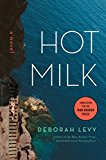Summary | Excerpt | Reviews | Beyond the Book | Readalikes | Genres & Themes | Author Bio

2015. Almería. Southern Spain. August.
Today I dropped my laptop on the concrete floor of a bar built on the beach. It was tucked under my arm and slid out of its black rubber sheath (designed like an envelope), landing screen side down. The digital page is now shattered but at least it still works. My laptop has all my life in it and knows more about me than anyone else.
So what I am saying is that if it is broken, so am I.
My screen saver is an image of a purple night sky crowded with stars, and constellations and the Milky Way, which takes its name from the classical Latin lactea. My mother told me years ago that I must write Milky Way like this – galaxi´aV ku´kloV – and that Aristotle gazed up at the milky circle in Chalcidice, thirty-four miles east of modern-day Thessaloniki, where my father was born. The oldest star is about 13 billion years old but the stars on my screen saver are two years old and were made in China. All this universe is now shattered.
There is nothing I can do about it. Apparently, there is a cybercafé in the next flyblown town and the man who owns it sometimes mends minor computer faults, but he'd have to send for a new screen and it will take a month to arrive. Will I still be here in a month? I don't know. It depends on my sick mother, who is sleeping under a mosquito net in the next room. She will wake up and shout, 'Get me water, Sofia,' and I will get her water and it will always be the wrong sort of water. I am not sure what water means any more but I will get her water as I understand it: from a bottle in the fridge, from a bottle that is not in the fridge, from the kettle in which the water has been boiled and left to cool. When I gaze at the star fields on my screen saver I often float out of time in the most peculiar way.
It's only 11 p.m. and I could be floating on my back in the sea looking up at the real night sky and the real Milky Way but I am nervous about jellyfish. Yesterday afternoon I got stung and it left a fierce purple whiplash welt on my left upper arm. I had to run across the hot sand to the injury hut at the end of the beach to get some ointment from the male student (full beard) whose job it is to sit there all day attending to tourists with stings. He told me that in Spain jellyfish are called medusas. I thought the Medusa was a Greek goddess who became a monster after being cursed and that her powerful gaze turned anyone who looked into her eyes to stone. So why would a jellyfish be named after her? He said yes, but he was guessing that the tentacles of the jellyfish resemble the hair of the Medusa, which in pictures is always a tangled mess of writhing snakes.
I had seen the cartoon Medusa image printed on the yellow danger flag outside the injury hut. She has tusks for teeth and crazy eyes.
'When the Medusa flag is flying it is best not to swim. Really it is at your own discretion.'
He dabbed the sting with cotton wool which he had soaked in heated-up seawater and then asked me to sign a form that looked like a petition. It was a list of all the people on the beach who had been stung that day. The form asked me for my name, age, occupation and country of origin. That's a lot of information to think about when your arm is blistered and burning. He explained he was required to ask me to fill it in to keep the injury hut open in the Spanish recession. If tourists did not have cause to use this service he would be out of a job, so he was obviously pleased about the medusas. They put bread in his mouth and petrol in his moped.
Peering at the form, I could see that the age of the people on the beach stung by medusas ranged from seven to seventy-four, and they mostly came from all over Spain but there were a few tourists from the UK and someone from Trieste. I have always wanted to go to Trieste because it sounds like tristesse, which is a light-hearted word, even though in French it means sadness. In Spanish it is tristeza, which is heavier than French sadness, more of a groan than a whisper.
Excerpted from Hot Milk by Deborah Levy. Copyright © 2016 by Deborah Levy. Excerpted by permission of Bloomsbury USA. All rights reserved. No part of this excerpt may be reproduced or reprinted without permission in writing from the publisher.
Your guide toexceptional books
BookBrowse seeks out and recommends the best in contemporary fiction and nonfiction—books that not only engage and entertain but also deepen our understanding of ourselves and the world around us.